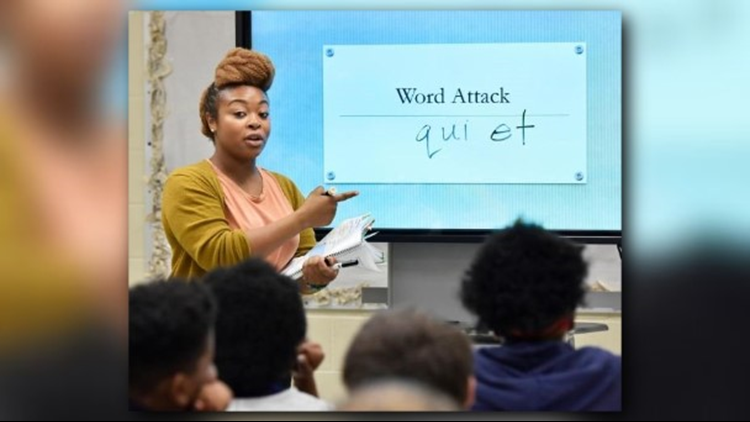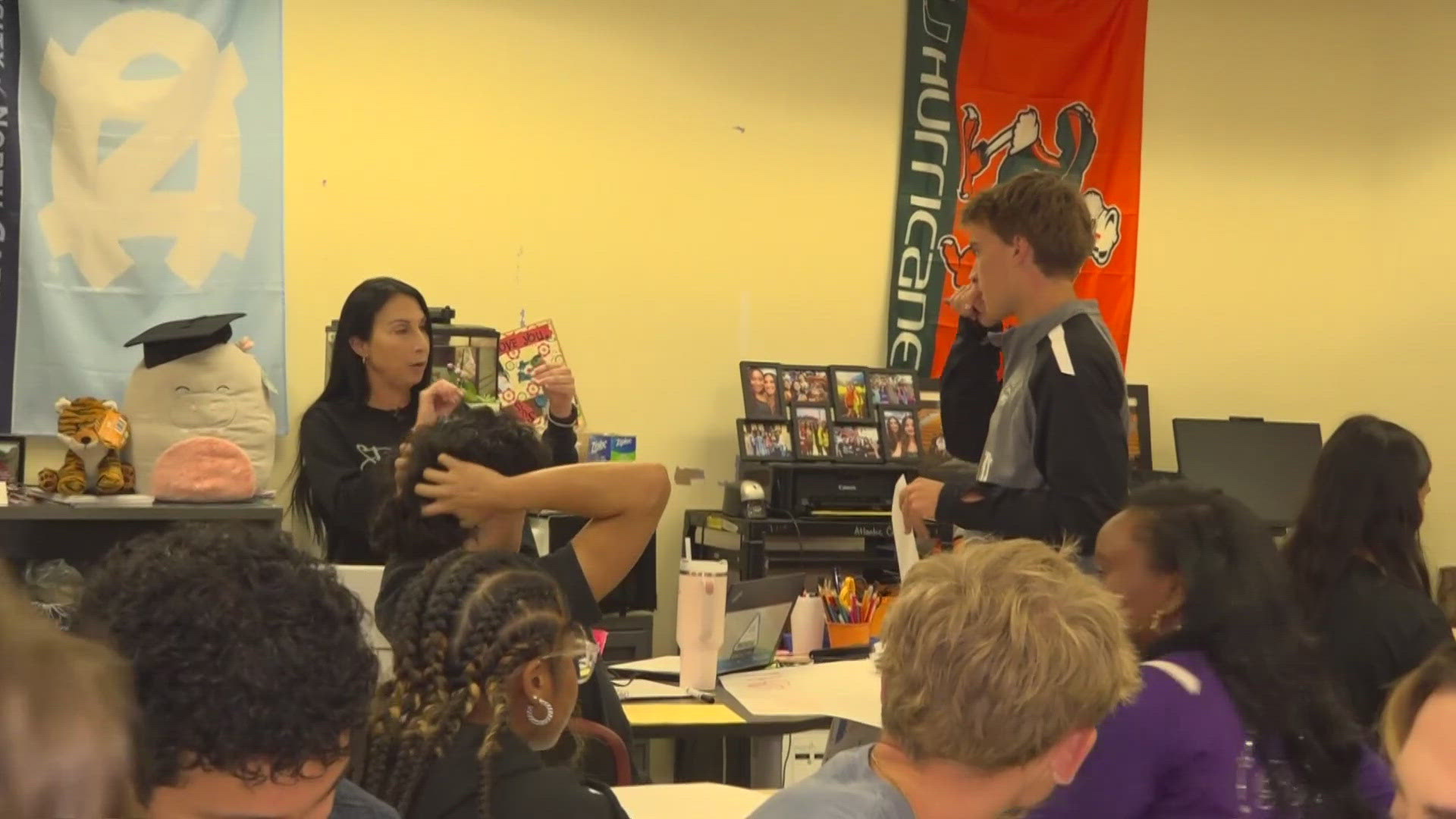In a rare event, principals of 21 D-rated and F-rated schools in Duval County laid bare their most pressing needs this week, asking for help from the NAACP and the community.
These are struggling but strong schools, said Wayne Green, a regional superintendent, but they face a state deadline to pull up their grades or be taken over or closed in a few years.
“It’s a lonely job, and everyone in the community thinks they can do that job,” Green said of the principals.
“We’ve hit the ground running and have been busy. But we ... continue to have more challenges as we push forward. We’ll receive your assistance with open arms because we need it.”
Around him, principals talked one by one about chronic absenteeism, literacy gaps, and a critical lack of mentors and other adults to show children how to grow up.
“We need all hands on deck to teach [students] how to control their anger and what steps to take instead of being impulsive,” said Kimberly Brown, Northwestern Middle’s principal.
But first, children need to go to school.
Absenteeism is climbing dramatically at Duval’s turnaround schools, said Wayman Graham, assistant principal at Ramona Boulevard Elementary.
Students at Duval’s turnaround elementary schools logged a total of 96,635 absences last year, up 19 percent from two years ago. Students at turnaround middle schools had 37,989 absences, up 47 percent from two years ago, he said.
At Susie Tolbert Elementary, for instance, more than half the 400 students missed 20 days or more last year, said Shana Adams, principal. She asked for volunteers to help make home visits.
Duval’s schools usually share social workers, often one to every five schools, principals said and truancy officers don’t crack down until the fifth absence.
“We want to catch it before then,” said Jacqueline Jones, principal at Brentwood Elementary.
Some absenteeism comes from suspensions, but much stems from family situations, principals said. Some parents work early hours and can’t put children on buses or walk them to school. Others don’t have cars or anyone at home but older siblings to care for sick youngsters, they said.
“Most elementary school students aren’t getting themselves up to go to school; that’s a parent responsibility,” Green said. “Sometimes parents want to do their absolute best but in some cases, they can’t.”
Some schools need morning programs to feed kids breakfast and provide tutoring before the school day starts, said Marva McKinney, Cedar Hills Elementary’s principal, but schools don’t have the resources.
Many parents don’t have it either, said Brown, adding that Northwestern Middle charges $60 a month for morning care and many families can’t afford it.
Add to absenteeism frequent student turnover. Many poor families move annually and even during the school year, usually for economic reasons, making it hard to ensure a student consistently improves at school, said Weisha Day-Killette, principal at Rufus Payne Elementary.
Discipline is improving but it’s still a major challenge at turnaround schools. Last year the schools had 15,469 total discipline referrals, 1 percent lower than two years ago, Graham said.
Adams, at Susie Tolbert, said parents have to step up, too. She recently asked parents at a meeting how many use their Facebook or Twitter accounts and nearly all hands raised, but when she asked how many use the district’s online account to track students’ progress, many hands fell.
“I said ‘Shame on you. You have to do better.’ We can’t do this by ourselves,” she said.
Lacking enough parent involvement, most principals are begging for mentors, especially since many schools lost their “intervention” specialists to budget cuts.
Cindy Gentry said she has seen an increase in troubling behavior among first-graders and kindergartners at Martin Luther King Jr. Elementary. Often, they’re coping with trauma from their high-crime neighborhood or struggling families.
“Kids are acting out because they don’t know how else to handle what’s happening in their lives,” Gentry said. “I’ve had multiple children who have had severe, traumatic experiences. They bring them to school.”
Duval’s school and city partners are upping mental health services, but Gentry said schools need individuals to help instill social skills, perhaps by running small “social circles” for children to talk and learn about conflict resolution or anger control.
It’s tough to counteract parents’ common instruction to “hit back” in fights, added Augena Sapp, Gregory Drive Elementary principal, who recommended more code of conduct training.
Erica Little-Bartley said her fourth- and fifth-grade girls at Rutledge Pearson Elementary need role models of “female empowerment” to counteract negative images on social media or in music videos. Brown, at Northwestern Middle, asked for male role models to help students build respect.
Hyde Park Elementary needs bus monitors to cut down on misbehavior, added Shirley Winfrey, its principal. Jones, at Brentwood, said volunteers could help on “restorative justice” panels, to help students make amends after an infraction.
Mentoring is making all the difference at Highlands Elementary, which has volunteers running the Highland Gents boys’ group and the chess club, said Principal Jeffrey Collins.
“With the Highland Gents I’ve seen a number of students completely transform, not only behaviorally but also in academics,” he said. “We also have a chess club. ... Last year when we played a middle school, I had some third-graders running circles around the middle-schoolers.”
Tangia Anderson had a similar story involving a volunteer who ran the From Girls to Queens group at George Washington Carver Elementary, but the volunteer could only help a small portion of the girls, she said.
Teachers also need mentoring.
Evan Daniels, principal at Arlington Middle, said he needs help from retired educators to give less experienced teachers more behavioral and instructional tools. “At many of these schools up to 50 percent of the teachers are in their first three years in the profession,” he said.
A lot of student misbehavior is linked to persistent reading and writing gaps, often putting students a year or more behind their peers, principals said.
Only 30 percent of Duval’s turnaround elementary students and 22 percent of turnaround middle school students passed state language arts exams last year; only 30 to 35 percent showed a year’s worth of gains.
Adams at Susie Tolbert said she’d like to get some retired educators to help with small group reading. Currently, students do a lot of “blended learning” on computers, she said, but that alone won’t fuel their progress.
“Our kids are used to not being monitored and doing things on their own,” she said. “But if we’re not listening to them read we can’t tell what kinds of mistakes they make and how to fix them. We do it, but we need more support. ... Having someone help and listen to them, that’s going to be powerful.”
Budget cuts in recent years have nearly depleted Duval’s pool of school librarians (now called media specialists) and closed or cut the hours of school libraries. Only three of the 21 principals said their school libraries are open full time.
There’s also a literacy gap among parents, which affects students, said Angela Maxey, Lake Forest Elementary’s principal. She said at a book fair where Scholastic donated 2,000 books, “I heard parents say ‘Don’t get that book; I ain’t going to be able to read it to you.’ ”
Jessica Guthrie, at Highlands Middle, said she wishes for a rolling cart full of books, especially teen novels and magazines for kids who like to read about sports and science, to cultivate a love of reading.
“It would be a true joy to see kids with books in their hands in the cafeteria at lunch,” Guthrie said.
“I come from an era where teachers still had classroom libraries and schools had a library, so a student had a couple of opportunities to check out books, encouraging reading outside of class. ... Now that is a struggle.”
Duval has a total of 29 schools it includes in its “turnaround region,” because it includes C-rated schools that are vulnerable to falling a grade.
New Superintendent Diana Greene reminded people that these schools are not defined by their state-issued grades.
“They are not D or F schools; they are schools that face many challenges,” Greene said. “We only get better when we decide we’re going to grow together. Someone needs to listen to the people who lead our schools and have responsibility over our children.”
Denise Smith Amos: (904) 359-4083



